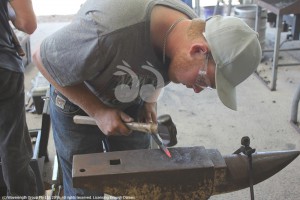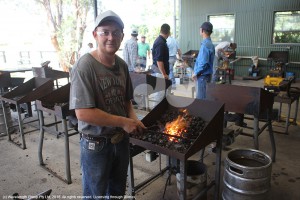Shoe in for Success
WHILE people in the cities could be mistaken for thinking farriering is a career of the past, the demand is far outstripping supply and Scone is one of only four campuses in Australia offering training in the trade.
The four year course is attracting apprentices from throughout New South Wales.
Students spend three days a month studying at the Scone TAFE and then apply their skills in the workplace.
Kace Potter lives in Dubbo and travels to Scone each month to learn his trade and has a scholarship which he said helps with the expenses of the course.
“I received the Brett Evans scholarship which is $5,000 a year for three years, which really helps buy tools, cover travel expenses and accommodation,” said Mr Potter.
“I’ve always had horses growing up and my family are all horse people, I really enjoy what I do,” he said.
“There is a lot of work that goes into becoming a good farrier, a lot of attention to detail, but it is worth it,” Kace Potter said.
Shannon Norley, master farrier and teacher at the Scone TAFE said it is a great career for people who are passionate about horses.
“The kids doing it are really committed to it, they love it, there is a small amount of blacksmithing, they make all of their own horse shoes and there is a fair range of anatomy so they leave with a good knowledge,” said Mr Norley.
“They have to have a great passion for horses, but horse shoeing could take you anywhere in the world America, Belgium, everywhere and they come out here to work with us; there are not too many jobs in the world where you could do that,” he said.
“There is a huge need for farriers, the amount of horses around is just unbelievable with racing industry, equestrian and all the horses in backyards, they are everywhere.
“There are 15 farriers in the area where I live near Maitland and I am constantly getting calls for new horses, people just can’t get a farrier.
“The cost can be a barrier to young people entering the industry,” he said.
“Without the right tools, they can’t get the right education,” he said.
“At the TAFE we have four sets of tools for first year, but then the students need their own.
“Jobs that are classed as job shortages do get a lump sum tool allowance, such as chefs and landscapers, so perhaps people don’t realise how in demand farriers are,” said Shannon Norley.
 Jake Watts moved from the north coast and now lives in Lochinvar to be closer to the farrier course.
Jake Watts moved from the north coast and now lives in Lochinvar to be closer to the farrier course.
“I was 24 when I started the course, I’d worked on stations for five years and done a few other bits and pieces and it was good to get that bit of experience,” said Mr Watts.
“It was a career where I can be around horses all day and earn a good living,” he said.
“You need to be willing to work hard, it’s not an easy road, but it’s worth it,” Jake Watts said.
Shannon said size is not a factor to be a successful farrier it is about horsemanship.
“Some of the males range from gorillas to jockey size,” he joked.
“Physically size and strength is completely irrelevant and some of the women in shoeing competitions blow the blokes out of the water.
“You must be strong, but you get job fit, you learn how to position yourself under the horse,” he said.
“If you have good knowledge and horsemanship you’d be right,” Shannon Norley said.
 scone.com.au
scone.com.au